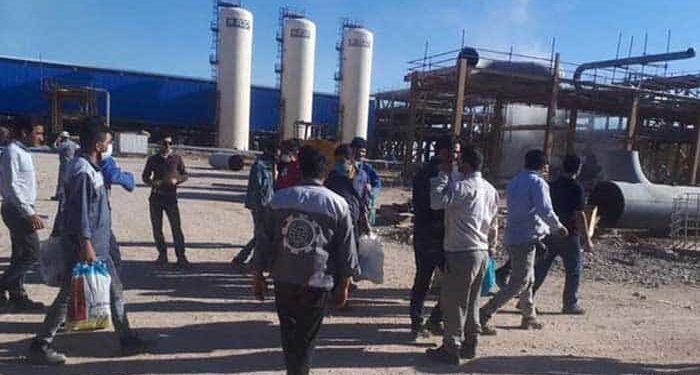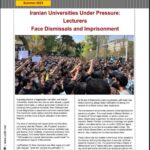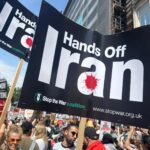
The strikes by oil and petrochemical contracted workers continue!
The strike by workers in the oil and petrochemical industries in Iran, which began on the 19th June, has spread to numerous sites across the vast oil and gas exploration fields as well as the oil industry in general. According to the statement released by the Union of Metalworkers and Mechanics of Iran (UMMI), 28,000 workers have downed tools (by Wednesday 30th June) and remain determined to stay out until their demands are met.
Many of the workforce in covering the refineries and petrochemical sector are skilled project workers and technicians contracted by labour broker companies in Iran. labour broker firms in effect operate as a buffer between the workers and the oil companies and petrochemical complexes in South Tehran. The typical project workers’ shift patterns mean that workers live onsite for 20 days each month and have then have 10 days rest during which they usually return to the cities, towns, and villages in the south of Iran where their families reside. During their time onsite they are accommodated in communal dormitories provided by labour broker firms and transported daily to and from the actual worksites aboard labour broker firms’ provided minibuses.
The Union of Metalworkers and Mechanics of Iran (UMMI) has listed the main demands of the striking workers as follows:
1- All employers are obliged to implement the rightful demand for a standard rotation of 20 working days onsite followed by 10 days of commensurate paid leave.
2- Insurance contributions must be based on the actual job titles and not capped at the level of an unskilled worker.
3- Wages must be paid monthly and without delay.
4- A copy of the employment contract on official headed paper, signed and sealed, must be handed to the respective employee.
5- Payments for works with duration of one month or less should be calculated according to the overhaul rate.
6- Workers also demand payment of bonuses and benefits, transportation costs, and child benefits; proper air-conditioning; an end to low-quality and repetitive meals; and an improvement of hygiene and sanitation in the dormitories.
One of the most important demands of the workers is that the labour broker firms (including HRSCI) be removed from all contractual engagements and relationships between the oil companies and the workforce, and that the same rules stipulated in the country’s labour code as well as equal wages be implemented across all refineries and plants in the oil, gas, and petrochemical sector. Other important demands include that wages be increased to at least 12-million tomans per month (roughly 340 GBP according to current exchange values) and that workplace safety be improved.
Unfortunately, employers have been reluctant to pay wages in compliance with the employment law for years now – forcing workers to exercise caution and try to protect themselves and their families in the face of scams. For example, the employment law states that the employer must pay a worker’s wage on a daily, weekly, or monthly basis. Nowhere does it state that the employer can delay the worker’s wages for three months plus or suddenly disappear having made no payment. In such cases, workers and their representatives have tried everything from direct correspondences, to requests to meet with their respective parliamentary representatives but to no avail.
Representatives of the striking workers have justified their industrial action as legitimate, stating:
“Peaceful protest against the violation of workers’ rights is a natural reaction and is recognised by all international laws and conventions, including the constitution and employment laws of our country. We hope that such civil protests will persuade the authorities and the government to find a reasonable and effective way to respond to the demands of the workers and that they respond positively and in active accordance with the respective ILO conventions on trade union structures and workers’ rights. This will solve many problems in the workplace.”
The strike began the day after the sham presidential election on 18th June installed the country’s notorious chief justice as president, in the culmination of a process that saw the barring of every candidate except for those deemed 100% loyal to the theocratic regime. A major boycott of the election meant that only 42% casted their ballots even according to official statistics.
The leader of the Union of Metalworkers and Mechanics of Iran (UMMI) dismissed any chance of there being positive change to come after the election, stating:
“The experience of the country’s toilers over the past decades has been that government administrations come and go. But the corrupt economic system in Iran has never changed. In fact, we have learned to pay more attention to the actions of the officials rather than their election campaign promises. As the proverb goes: ‘A good beginning makes a good ending.’ According to the Shargh newspaper on 20 June 2021, the initial speeches given and moves taken in Mr. Raisi’s election campaign were to offer reassurances to the stock market and the private sector of the economy. According to the same paper, Mr. Raisi, in a meeting with the Chamber of Commerce, stated: ‘The economy should be left to the private sector. Anything that slows down the private sector must be eliminated.’”
Iranian strikers have asked for immediate solidarity in the form of statements of support:
“All Iranian people, wherever they are, can help the striking project workers. Our journalist friends and those with access to social media can alert their communities to these injustices by publishing our news. By uniting with us and giving coverage to our legitimate demands, the trade unions can send a clear and unequivocal message to the supporters and agents of neo-liberalism that, ‘Every worker is the brother of another worker and accompanies him in joy and sorrow.’ Solidarity at regional, national, and international levels can force the authorities to realise that they must pay the workers their rightful dues. It is a fact that such solidarity is only natural and has a great effect on motivating workers to insist upon the realisation of their legal rights.”
Responding to CODIR’s call for solidarity, IndustriALL Global Union has extended its support to the striking workers. In a message on 1st July, Kemal Özkan, IndustriALL’s Assistant General Secretary stated:
“Workers in Iran are showing tremendous courage and resolve in defending their rights, despite not having the luxury of being represented by free and independent unions. They face many dangers, including severe oppression. IndustriALL expresses its full solidarity with these workers, who are taking collective action to defend themselves, to improve their conditions, and to demand the economic and political development of the country to meet the needs of the many.
We admire their resilience and courage and fully support their demands for decent wages and living conditions, direct contracts with the oil and gas companies, and for the right to bargain collectively.
Iran needs to recognize independent trade unions.”













 Posted in
Posted in 











